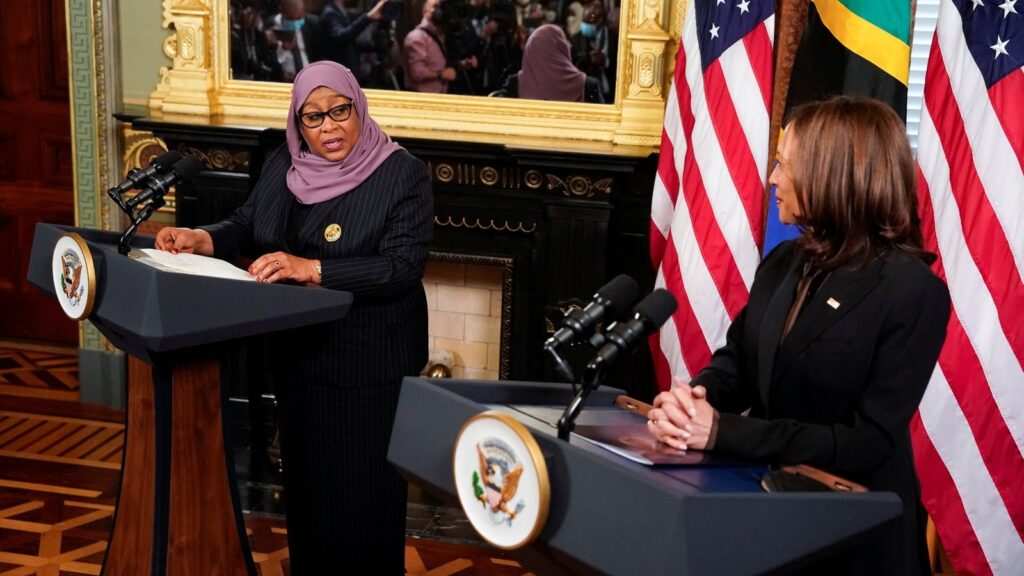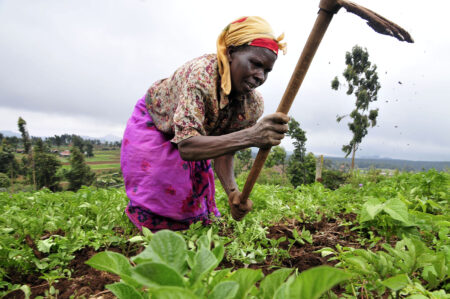- According to the US review has maintained a solid macroeconomic foundation, sound fiscal policies, and rich natural endowments.
- The report credits Samia’s administration for its ‘strong regulatory framework, sound macroeconomic fundamentals and creation of a vibrant financial market.’
- the US recognizes Tanzania’s favorable investment policies under president Samia Suluhu Hassan.
Tanzania’s President Samia Suluhu Hassan promised reforms to improve the country’s business climate when she came into power in 2021 and singled out attracting foreign investment as a key priority. Suluhu’s shift in policy to attract investment will be part of the discussion with US Vice President Kamala Harris who visits the country this week as part of a three-state visit by Harris.
“This commitment to increasing investment has continued throughout her tenure and economic issues remain at the forefront of the administration’s policies, strategies, and goals,” notes the U.S. Department of State.
Absa Bank Africa Financial Markets Index 2022 recognizes Tanzania as a business-friendly environment and top priority investment destination.
In the report, an annual summary highlighting economies with the most supportive environment for effective markets, Absa Bank ranks Tanzania as one of the best investment destinations in Africa.
The report credits Samia’s administration for its ‘strong regulatory framework, sound macroeconomic fundamentals and creation of a vibrant financial market.’
Similarly, the U.S. Department of State Investment Climate Statements highlights Tanzania as a key investment economy for its private sector. The annual report provides information on the business climates of more than 170 economies.
Also Read: Tanzania attracts hundreds of investments in just nine months
The analysis is provided by US economic officers stationed in embassies and posts around the world who analyse a variety of economies that are or could be marketed for U.S. businesses.
Through these business guide statements, investors get information on a wide range of topics including openness to investment, legal and regulatory systems, dispute resolution, intellectual property rights, transparency, performance requirements, State-Owned Enterprises, responsible business conduct, and corruption.
According to the US review, Tanzania, which achieved lower-middle income country status three years ago, has maintained a solid macroeconomic foundation, sound fiscal policies, and rich natural endowments.
Further still, the US statement on investment viability in Tanzania points out that due to its strategic and geographic position, the country offers diverse economic fronts that have made the country resilient to external shocks.
“This proved critical as the COVID-19 pandemic resulted in an economic downturn, though Tanzania avoided a more severe pandemic-induced recession,” reads the statement in part.
Policy reforms under Suluhu’s administration
Other than the geographical positioning advantage, the US recognizes Tanzania’s favorable investment policies under president Samia Suluhu Hassan.
President Samia has led significant changes to the country’s foreign relations direction and in so doing, has significantly improved Tanzania’s business environment and investment climate.
Tanzania has improved and eased what was otherwise a rather complex, and even inconsistent investment environment. President Samia, the first female president of the country, has worked on investment barriers such as work permit issuance for foreign workers and investors. The government has streamlined operations of the country’s investment arm, the Tanzania Investment Center (TIC).
On the other hand, the US would like to see more business legislative reforms citing laws like the Natural Resources and Wealth Act, Permanent Sovereignty Act, Public Private Partnership Act, and the Mining Laws and Regulations.
“Despite pledges by President Hassan and senior government officials, these have yet to be resolved; rather, the administration has selectively eased the application of these laws,” the US decries.
According to the U.S. Department of State Investment Climate Statements on Tanzania, the primary business and investment challenges remain in tax administration, the process of opening and closing businesses, inconsistent institutions compounded by corruption, and requests for “facilitation payments” at many levels of government and what the statement deems as cross-border trade obstacles.
“Corruption, especially in government procurement, taxation, and customs clearance remains a concern for foreign investors, though the government has prioritized efforts to combat the practice,” admits the US.
That being said, the US urges its business community to prioritize Tanzania in infrastructure, transportation, energy, mining and extractive industries, tourism, agriculture, fishing, agro-processing, and manufacturing sectors.
Other investment priority areas for US and other foreign businesses include petroleum and mining, real estate, transportation, services, and ICT. With agriculture as the biggest employer in Tanzania, investment in this sector has diverse multiplier effects.
Tanzania has the 2nd largest livestock population in Africa but, “less than 1% of all meat is processed locally, at the same time vast quantities of processed meat are imported,” admits the Tanzania Investment Center; a fact that makes investment in meat processing in Tanzania a key investment target.
Also, Tanzania’s Territorial Sea area covers more than 64,000 km2 and of this, its Exclusive Economic Zone (EEZ) covers an area of about 223,000 km2 of which 1,424 km stretches all along the coastline of the Indian Ocean.
As to what to grow on all this fertile land, TIC would have you consider sugar production for instance. According to TIC, Tanzania has a demand gap for sugar in excess of 220,000 tonnes, which is currently been met by imports.
”The sugar supply gap is set to increase at an estimated 6% per annum from the current 300,000 tons/year,” TIC reports.
Yet, according to TIC, “Tanzania has among the highest average cane yields in the world, at 120 tons/ha due to good soils and climate.”
Also Read: KAM calls for probe into reports of the release of Edible oils
Then there is the edible oil market, a vast and growing market both in Tanzania and in all its neighboring countries.
TIC reports that Tanzania spends more than US$ 150,000 annually in the importation of edible oil. For the US, and other foreign investors, here the opportunity is vast, extending far beyond field growing covering various aspects of the edible oil value chain.
As the government investment agency admits, Tanzania lacks modern mechanical extraction equipment, value-addition facilities, low recycling capacity, storage, and logistics, all of which have rendered the country dependent on imported edible oil.
Investors in this sector would enjoy Tanzania’s rich soils and climate which allows for profitable growth of sunflower, cotton, groundnuts, soya beans, and palm, the diverse crops used to produce edible oil.
It is expected that US Vice President Kamala Harris will carry this message to US investors and that her trip will see an increase in US investment in agriculture as well as the other mentioned priority areas over the coming years.











